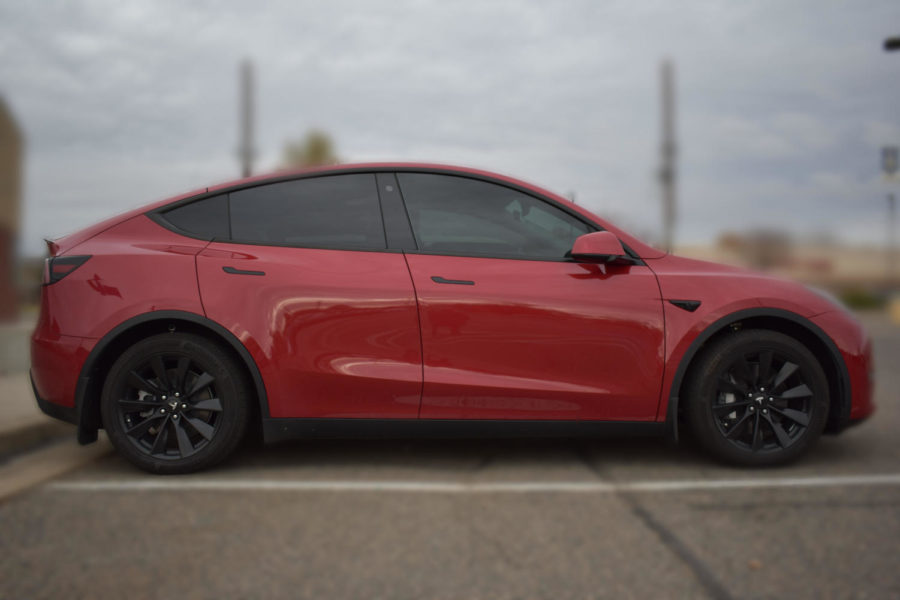Electric vehicles; taking the world by supposedly solar-powered storm
Electric Vehicles are taking world by storm
Everywhere people look, electric vehicles, more commonly referred to as EVs, have been popping up, seemingly out of nowhere. Tesla, leading the charge, has sold almost 2 million EVs since when the company was founded in 2003. Additionally, 32% of all Tesla vehicles sold since 2016 were sold in the first half of 2021. Tesla is the largest EV company worldwide and has sold more EVs than any of its competitors. The future seems to be all about EVs as the world enters this new epoch of environmentally-friendly technology and transportation.
The fact that society hasn’t fully transitioned to EVs seems ridiculous since they have been around since the 1800s. Despite the fact that Tesla, for example, was founded in just 2003, Robert Anderson developed the first crude electric vehicle in 1832. Regardless, it wasn’t until the 1870s or later that electric cars became practical. Given that large companies developing electric vehicles (or existing companies opening their own electric vehicle platforms) have only been established recently, electric vehicles seem fairly recent.
Over the past few decades, the world has seen advanced innovation within the EV industry. Technologies such as improved battery storage and charging stations have made it possible for more companies than just Tesla to start manufacturing and selling electric cars. According to Drive Electric Colorado, “There are currently more than 1,500 public Level 2 and DC Fast Charging Stations across the state representing over 3,300 charging ports, with more being added every day.”
For future drivers, this is great news: it means that more and more people will be able to replace gas-powered vehicles with cleaner electric cars. As more teenagers get their licenses, it’s worth wondering if EVs are something teens should invest more attention to. Our World in Data explains that over roughly 200 years, emissions have gotten exponentially worse. This is due to population levels. The more people the earth has, the more gas-powered vehicles and power plants burn to provide the world with energy and transportation. As the planet scrambles to protect the environment, teens wonder what they can do to help.
EVs provide environmental benefits. According to EDF Energy, “They emit fewer greenhouse gases and air pollutants than petrol or diesel cars. And this takes into account their production, as well as electricity generation to keep them running.” In addition to this, the batteries for Tesla, at least, are reused, so the environmental factors of disposing of the batteries are considered. Companies such as Redwood, Volvo, Ford, and Hyundai are also making strides to recycle their electric vehicles.
Hyundai, for example, explains, “The average life cycle of an EV battery is about 7 to 10 years. Today, around 500 used batteries have been collected in Korea, and that number is forecasted to reach 420k in 2030. Since automotive batteries consist of hazardous materials, it’s necessary to find a way to reuse them, and ESS is a top solution. ESS stands for ‘Energy Storage System’ and UBESS refers to a ‘Used Battery Energy Storage System’.”
However, according to an article in the New York Times, “Broadly speaking, most electric cars sold today tend to produce significantly fewer planet-warming emissions than most cars fueled with gasoline. But a lot depends on how much coal is being burned to charge up those plug-in vehicles. And electric grids still need to get much, much cleaner before electric vehicles are truly emissions free.”
They go on to explain, “Like many other batteries, the lithium-ion cells that power most electric vehicles rely on raw materials — like cobalt, lithium and rare earth elements — that have been linked to grave environmental and human rights concerns. Cobalt has been especially problematic…Mr. Daudin said, manufacturers need to work with these mines to lessen their environmental footprint and make sure miners are working in safe conditions. If companies acted responsibly, the rise of electric vehicles would be a great opportunity for countries like Congo, he said. But if they don’t, “they will put the environment, and many, many miners’ lives at risk.”
So despite the environmental benefits the vehicles provide, we still must answer the question of whether or not those benefits outweigh the deficits. Matthew Studenny, Chemistry teacher at Arvada West, and owner of a Tesla Model Y, explains his thoughts on the matter.
“We didn’t buy it purely because we thought, like ‘This is gonna completely reverse our environmental impact.’ We realize that the energy we’re using to charge it is coming from non-renewable sources, and we realize that the production of the car itself…When we bought it, we had in mind that we also were going to install solar panels, and that would make us feel really good about that aspect of it. So, I think there’s certainly room for improvement with that. I think people really need to be realistic that, yes, it doesn’t emit any harmful by products, but there’s still all of the other things around producing a car, and producing energy, and so I think that as a whole, the country can do better with that.”
Colorado and The United States itself also even offer incentives for owning an EV. Drive Electric Colorado informs us that, “Colorado residents are able to claim an additional state tax credit of $2,500 when they buy an electric vehicle. Some dealers offer this at point of sale. The credits decrease every few years from $2,500 during January 2021 – 2023 to $2,000 from 2023-2026.”
Even with these money-savers, an issue that often crops up with drivers looking to buy an EV is the cost, but even that is beginning to decline as more people transition. With gas prices reaching an all-time high of $4.91 a gallon in June of 2022, many people question if they should switch to an electric car, or if this will save money with the price of electric cars and the electricity to charge them. Considering gas and most maintenance costs aren’t required with an EV, going electric appears to be the most economical option.
Electric vehicles are the future of transportation. The data of whether or not long-term, these cars will actually benefit the environment is still unclear, but as more monetary factors come into play, people will want to make changes in their lives that benefit them financially. As our planet continues to grow and simultaneously decay, electric cars will be a viable option for generations to come.

Maci is a senior and a four-year member of The Westwind staff, now in her second year as Editor-in-Chief. She fell in love with journalism freshman year...



